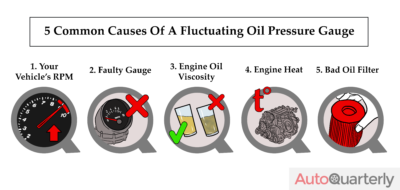Unlike many other gauges in a car, the oil pressure gauge sometimes behaves so erratically it defies common sense and stomps many drivers. In the majority of those cases though, you don’t have to panic because low oil pressure is one of the least things that can cause serious problems in your car unless the oil pressure condition is a symptom of another more serious issue elsewhere.
Still, the oil pressure gauge is there for a reason. In fact, it certainly helps to have some idea of what’s behind the fluctuations. If you can tell what’s causing your oil pressure gauge to act strangely, you’d be more experienced and have a better understanding of how your car’s engine works.
So, what are some common causes of a fluctuating oil pressure gauge?
1. Your Vehicle’s RPM
Your car’s engine and oil pump are members of the internal combustion family. The pump helps to distribute oil to the camshaft, rotating bearings, and sliding pistons. The oil pump rotates faster and therefore pumps more oil when the engine’s revolutions per minute (RPMs) rise. The process is slower with low RPMs.
No matter the RPM, the oil pump tries to distribute sufficient oil to the engine components that require lubrication. Excess oil is poured back into the oil pan. If everything is operating correctly, the by-pass mechanism should keep the oil pressure gauge stable. However, it’s common for higher RPMs to display somewhat higher oil pressure.
2. Faulty Gauge
Oil pressure gauges come in two variants, but none of them are without their headache. Engine vibrations and road-induced jarring can cause mechanical oil gauges- the types that operate with tiny springs and levers- to become filthy, loose, worn, or show inconsistent readings.
Electric oil pressure gauges, on the other hand, are prone to rust. Because the sensors of electric gauges get activated over a small range of electrical resistance measurements, even a tiny amount of corrosion can result in significant changes in readings.
3. Engine Oil Viscosity
As per simple physics, pumping thicker liquids requires comparatively extra pressure than pumping thinner liquids. Regarding car engines, most manufacturers recommend multi-viscosity (multigrade) oils because they maintain optimum viscosity over the engine operating temperature range.
What this means is that multigrade oil should provide better lubrication at high and low temperatures. The catch, though, is that dirt and pollutants dilute the oil as it ages between replacements. So, you can expect the pressure gauge to act accordingly when this change occurs. Therefore, don’t be surprised to notice unusual fluctuations in oil pressure readings following an oil change.
4. Engine Heat
As stated before, engine temperature influences oil viscosity. Multi-viscosity oil is designed to be as thin as a 5-weight oil at startup while providing the engine with 30-weight protection at typical operating temperatures. Brilliant, right?
But if your engine is considerably cold or operating hotter than normal, the viscosity-changing chemistry in the multigrade oil may fall short of doing the job, and your oil pressure will fluctuate as a result.
5. Bad Oil Filter
Most engine manufacturers include an anti-drain back valve in the engine’s oil filters. The valve prevents oil from flowing downwards and away from key engine components when the engine is idle. The oil supply channels within the engine leak oil if the valve is missing. After starting the engine, the oil pump will need a few seconds to refill the supply channels. During those few seconds, the pressure gauge reads relatively low.
Besides the readings of the pressure gauge, you could also hear loud ticking noises coming from the engine. Then the gauge suddenly raises to normal, and the ticking noise stops. Expect the problem to be worse in the mornings after the car has sat idle overnight. However, the issue should be resolved once you replace the oil filter.
To Recap
A fluctuating oil gauge is unlikely to cause a mechanical failure in your vehicle, but you shouldn’t ignore erratic readings because they can be indicative of other serious issues. Also, a fluctuating oil gauge when your car’s engine revolution per minute increases is perfectly normal. Other than that, a faulty gauge, oil condition, and bad oil filter can be directly responsible for the fluctuating oil pressure gauge.



